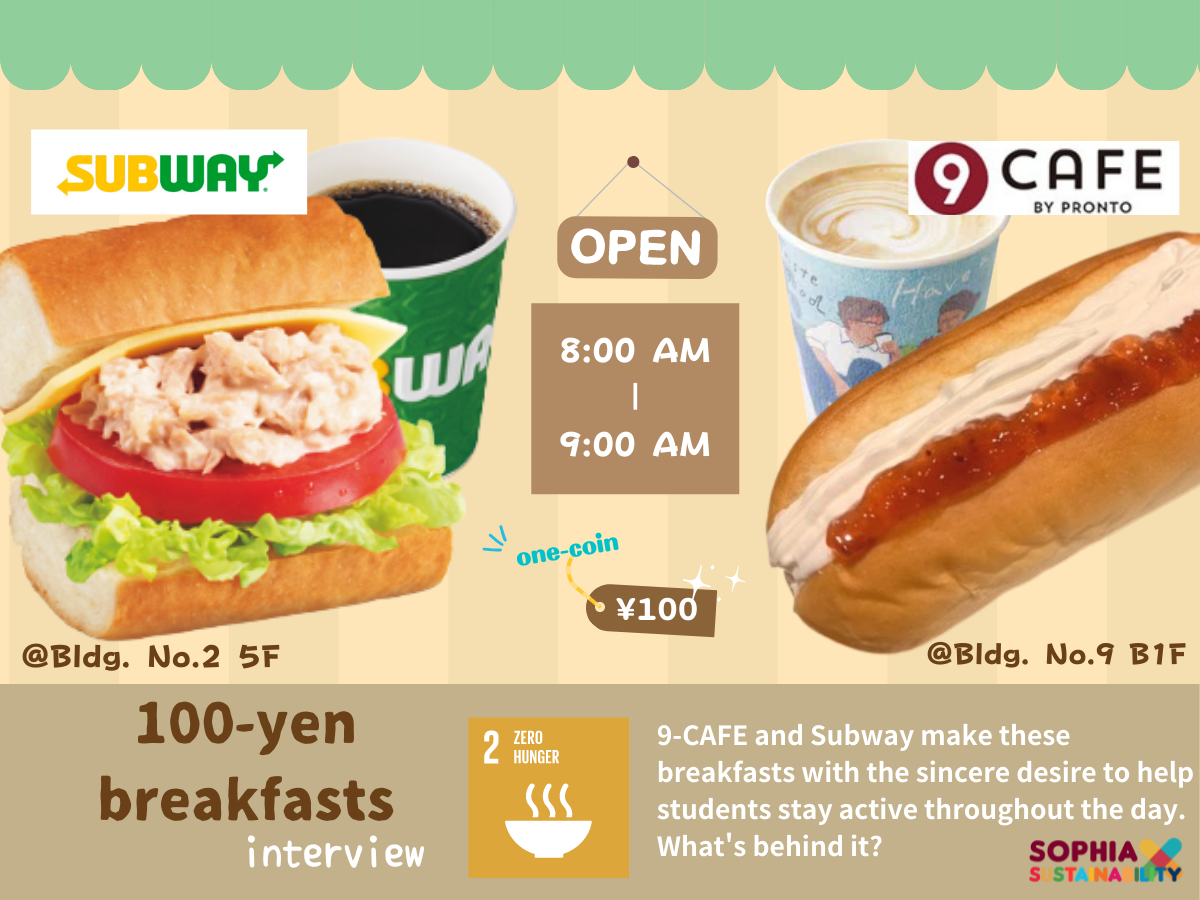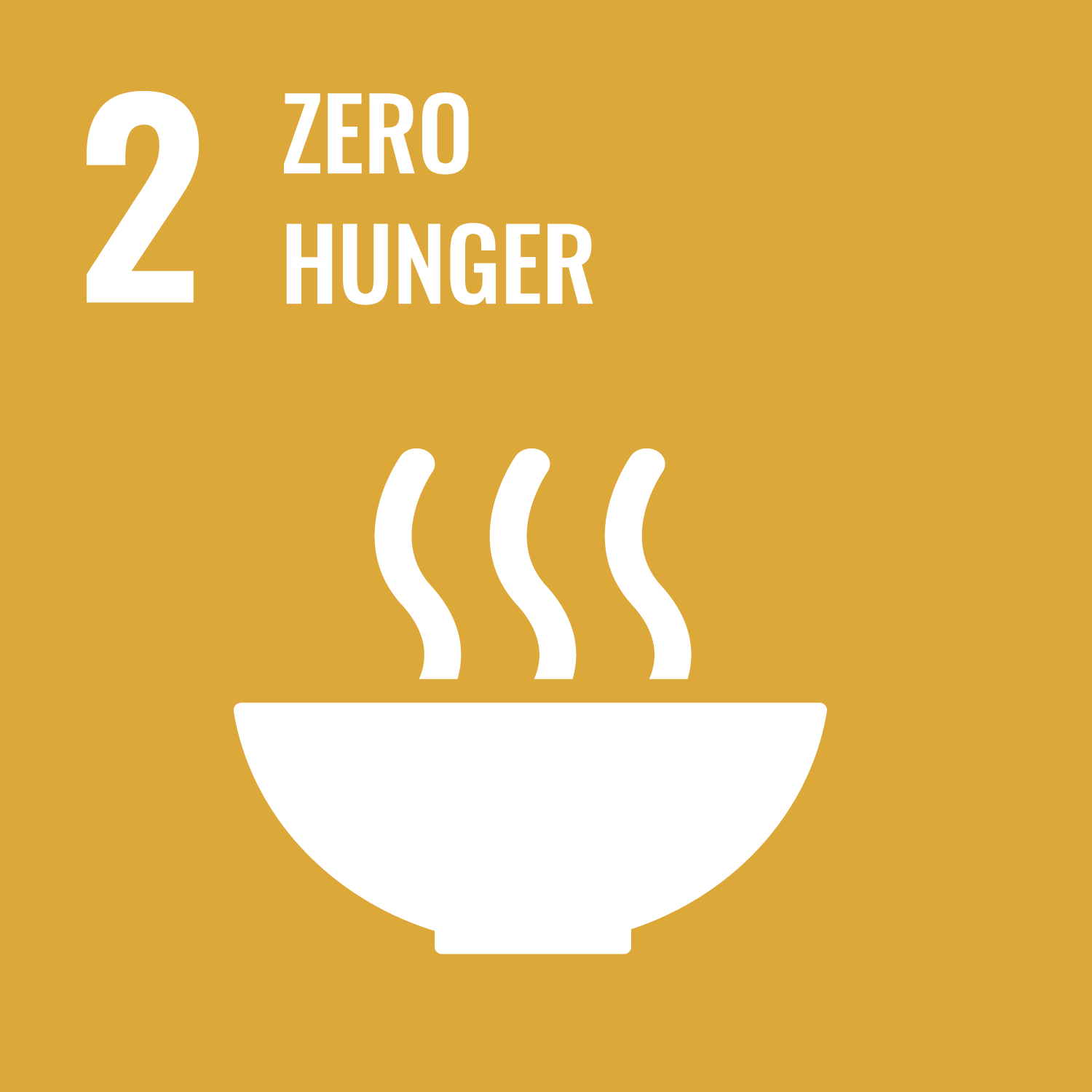【Part2】100-yen breakfasts:What’s behind it? (Interview with Mr. Masayama from the Sophia University Office of Property / Takashi Munakata President of the Sophia University Parents’ Association)
- Sophia School Corporation
- Social & Local Cooperation
Working with students to make the student cafeteria more than just a place for eating
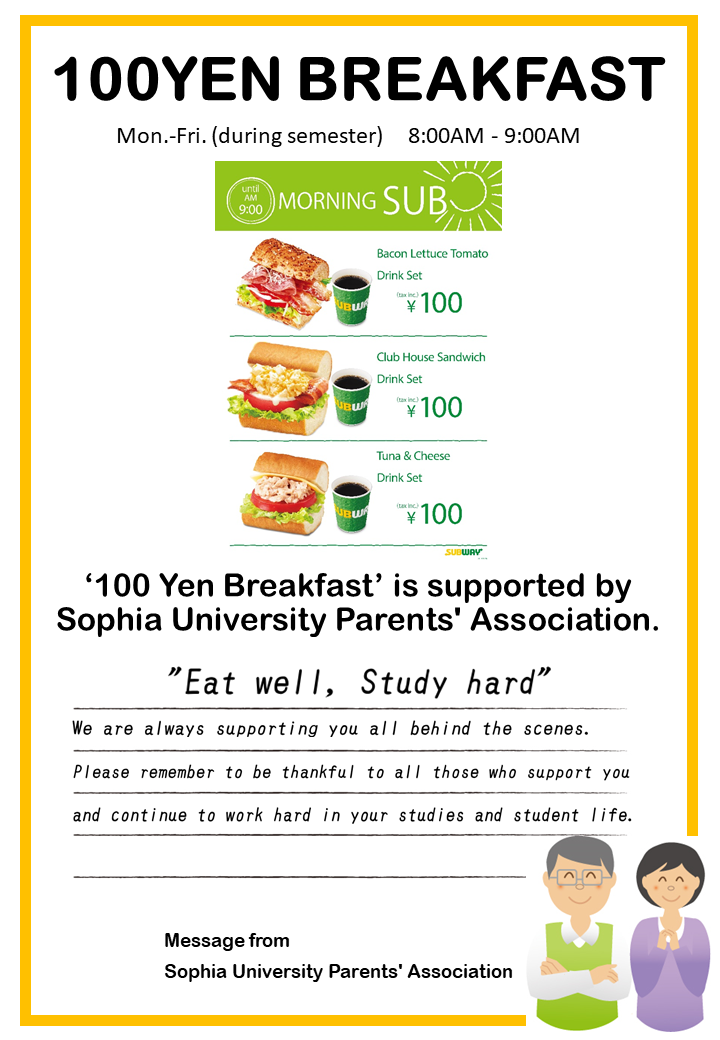
—Interview with Mr. Masayama from the Sophia University Office of Property
The 100-yen breakfast initiative is a joint effort by Sophia University, 9-CAFE, and Subway. How is the university able to provide breakfasts for just 100 yen?
We asked Mr. Masayama from the Sophia University Office of Property about how the 100-yen breakfast initiative is run, his outlook for the future, and how students can cooperate.
Each menu actually costs 350 yen, but the Sophia University Parents’ Association provides support of 250 yen per meal, meaning we can provide it to students for just 100 yen.
Although there are many other universities that provide 100-yen breakfasts, very few provide this support year-round like at Sophia University. This operation has been made possible by the generous support of the Association.
—Cheap 100-yen breakfasts that are available freely to everyone have created a great feeling of satisfaction among students.
I think so too. When we started providing 100-yen breakfasts in 2015, we carried out a survey about it among the students. We received positive comments such as “It has given me more time before classes,” “I have started coming to the university early to study,” and “It has been a great help financially.”
—Are you planning to make the menu more varied in the future?
As a university, the more choices we can offer students the better, so we plan to make more additions. We plan to begin offering Japanese foods again, as they have been suspended for a while, and in terms of diversity, we hope to offer a wider range of possibilities, such as a halal menu and vegan 100-yen breakfasts.
—Amid swiftly changing circumstances, I imagine it must be difficult to manage the 100-yen breakfast initiative.
We want to offer more variety, but to operate the 100-yen breakfast initiative, it is crucial that we have staff who can make the meals. In all honesty, it is difficult to find staff who are able to have the meals ready to serve from 8 a.m.
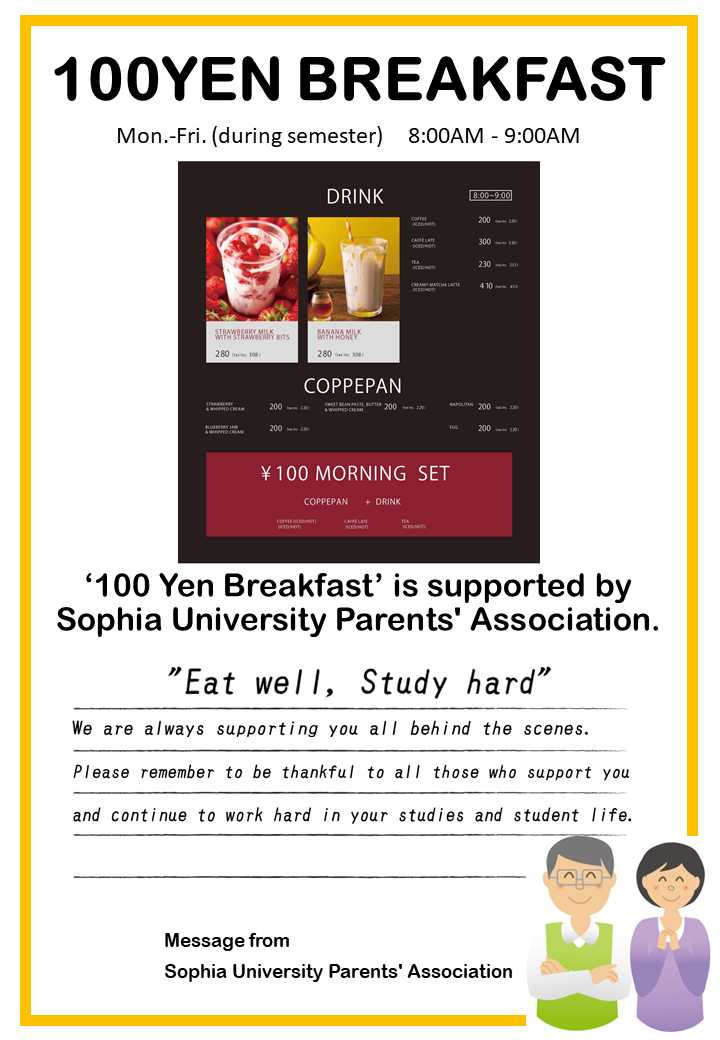
Therefore, we are not solely focusing on the 100-yen breakfasts, but also using the support from the Association to provide an off-peak discount service at the Building No. 2 5th floor cafeteria. This enables students to purchase meals from the lunchtime menu at a 100-yen discount during off-peak times. The aims behind this are to support students financially and reduce crowding in the cafeteria at lunchtime.
—How would you like students to help?
Rather than using the cafeteria as a place that is only for eating, I would like them to use it as a place where they can deepen their thinking, knowledge, and learning.
Sophia University is working to foster respect for diverse values through food, through things like a halal cafeteria and vegan menus. By advancing these initiatives in the familiar setting of a cafeteria, we hope to deepen the understanding of diversity, even among students who do not need these services.
Going forward, we would like to try various initiatives. For example, recently a student group has started a project that uses vegetable leftovers from the Building No. 11 cafeteria to create compost, and in another idea from the student staff of the Office of Sophia Sustainability Promotion, the use of personal containers is being allowed in school cafeterias and kitchen cars. In this way, the university and students are working together on various SDG initiatives that reflect the voices of students.
Students are the driving force of the university. I would like to hear the ideas of our students so we can make our cafeterias more meaningful places. Please come and share your thoughts!
100-yen Breakfasts That Embody Parental Feelings
—Interview with, Takashi Munakata President of the Sophia University Parents’ Association
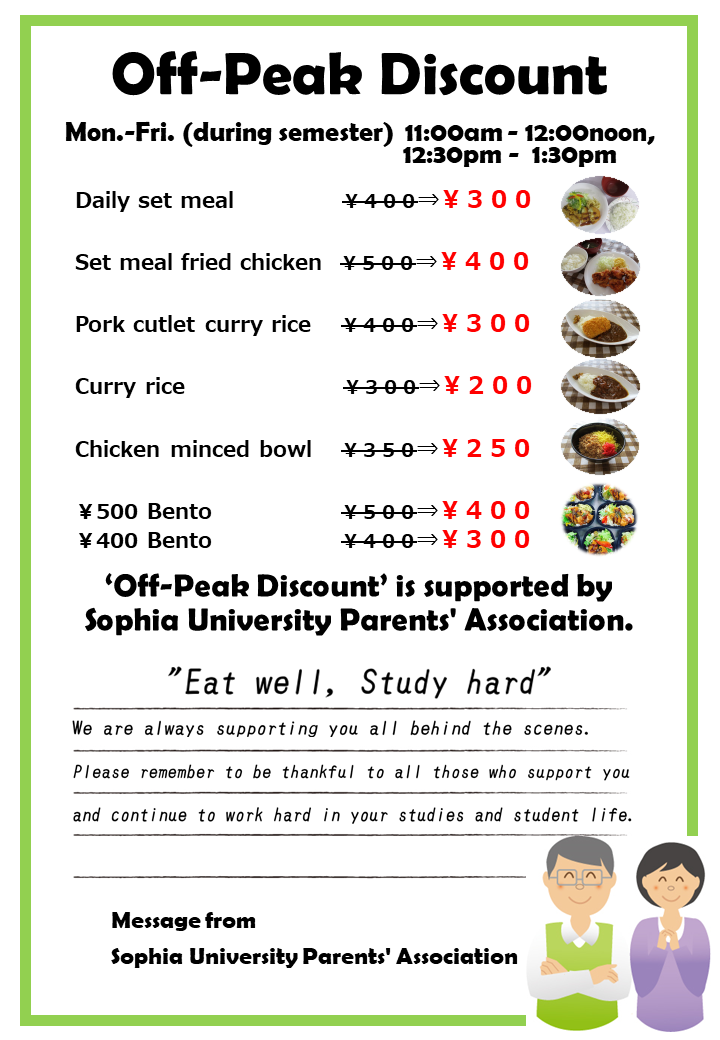
100-yen breakfasts have been bringing joy to student life through a varied menu that provides satisfaction in terms of both flavor and price, including soft bread rolls, sandwiches, and Japanese foods.
Did you know that 100-yen breakfasts are available thanks to the support of the Sophia University Parents’ Association, an organization made up of the parents and guardians of Sophia University students? What are the parental feelings and Association’s hopes that have gone into this support?
We interviewed the Sophia University Parents’ Association President Mr. Munakata, who spoke on behalf of the Association.
—Please tell us about how the 100-yen breakfast initiative started.
In 2014, one of the officers of the Association, who had heard about 100-yen breakfast initiatives at other universities, proposed that we try to do the same thing at Sophia. The university also showed enthusiasm about the proposal, so first we tried out a discount lunch campaign as a kind of pre-event before fully committing to the breakfast initiative. The lunch campaign was very well received by the students, so in 2015, we launched the 100-yen breakfast initiative in earnest. We continue to provide this support today.
—The Association has been providing this support for eight years now. How much has it cost to date?
The cumulative total of funding provided from 2014 to 2021 amounts to 45 million yen.
The amount of support has risen over the years in proportion to need, although we had to stop providing the breakfasts in 2020 due to the pandemic.
—That is a considerable amount of support! What kind of feelings go into the provision of the 100-yen breakfasts?
The Association’s members are all parents of students, so we share the strong feelings toward our children that all parents have.
As parents, we want students to put their health first, even before studying. Especially now, as the COVID-19 pandemic is preventing people from meeting each other, it is important that they pay attention not only to their physical health, but also mental health.
Naturally, learning and studying well is important, so to be able to do this, we want them to eat properly and keep their minds and bodies healthy. I think this is a wish shared by all parents.
—What results are you hoping to see from the 100-yen breakfast initiative?
We hope to lower the “hurdles” that makes it harder for students to eat breakfast.
I also lived alone when I was a student, so I know how hard it can be for a student to be able to eat a proper breakfast.
There are three reasons for this. The first is time. I think that rather than prepare a breakfast, students would prefer to use that time for sleep. The second is price. Even a relatively cheap breakfast still costs money. Finally, there is the hassle involved in making breakfast. By mitigating these, I think we provide students with the motivation to head to campus early in the morning.
We hope that the 100-yen breakfasts will lower these three hurdles so that eating breakfast becomes a routine that provides students with the energy to do their best for the rest of the day.
—Please share a message for our students!
We would like as many people as possible to know about the 100-yen breakfasts and that it is supported by the Association. We would be really grateful if you could share information about it with the students around you and your parents or guardians.
Most importantly, please take advantage of this support.
Our greatest wish as parents is for all of you to have happy, healthy student lives. This is why the 100-yen breakfasts are the most important part of the support provided by the Association. I also think that it is the easiest support to receive and understand from a student perspective.
We hope so many people will use the service that we will receive even greater demand for support!
—As someone who regularly uses the 100-yen breakfasts, I am extremely happy with both the size of the portions and the flavor. I hope more people will use the initiative and share this feeling of satisfaction.
I think there are many people who do not expect much in terms of portion size and flavor because of the 100-yen price. However, we have continuously made improvements over the years based on things like student surveys and I think we have arrived at a menu that is satisfying.
Even though the price is only 100 yen, I can confidently recommend the breakfasts in terms of both quality and volume. I would like everyone to try one for yourself and then tell the people around you about how good it is.
We parents and guardians are always supporting students. Please show your gratitude to the people supporting you by always doing your best in studies and student life. I would also like you to embody the “For Others, With Others” spirit by providing others with similar support once you graduate and start your career.
(Student Staff Oh, Harada and Shimizu from Office of Sophia Sustainability Promotion)
